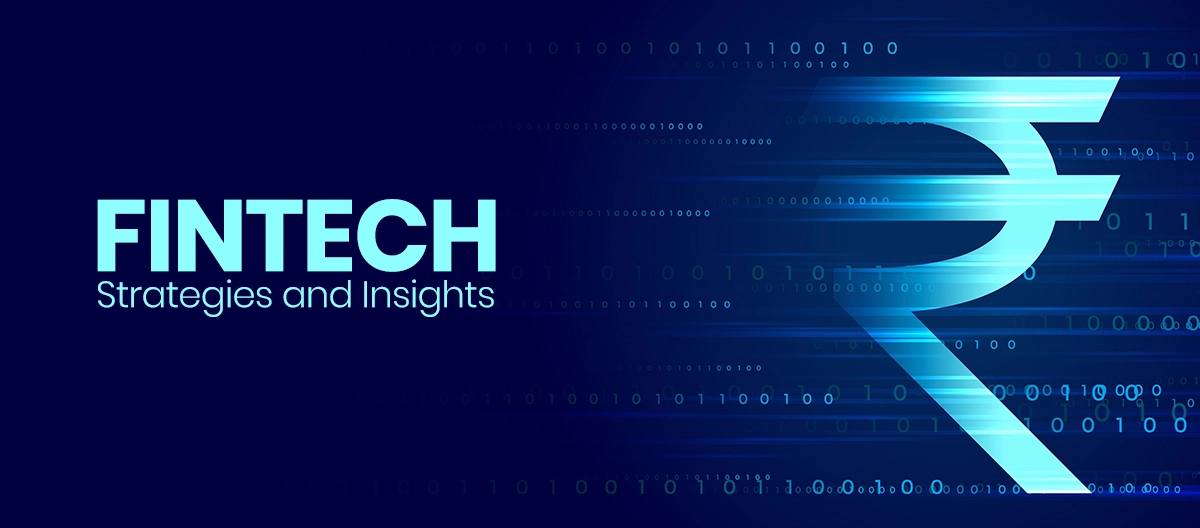Things are becoming more accessible with the increasing use of the internet and innovation in technology.
Whether it's about shopping online, ordering food, or watching movies, everything like everything can be done online.
So does financial services.
There has an immense growth in the fintech sector over the past decade.
According to a report by KPMG, global fintech investment surged to $210 billion in 2021, reflecting a compound annual growth rate (CAGR) of 25% over the past five years.
The financial technology (fintech) sector has revolutionized the way people access financial services, making them more inclusive, accessible and efficient.
With growing Fintech startups, competition is increasing and to make their position fintech startup are heavily spending on digital platforms and leveraging digital marketing effectively.
Topics covered in the blog
1. Types of different Fintech products
2. Digital revolution in the Fintech market in India
3. Challenges in Fintech Marketing
4. Role of Digital Marketing
5. Different Digital Marketing Strategies
5.1 Customer acquisition
5.2 Brand Building and Trust
5.3 Enhancing Customer Engagement
5.4 Data-Driven Marketing Strategies
6. Case Studies of Indian Fintech Brands
7. Key takeaway
Types of different Fintech products
1. Digital Banking/Neobanks
These are fully online banks that offer services like checking accounts, savings accounts, and debit cards, often with lower fees and more user-friendly interfaces than traditional banks.
Examples: Jupiter, Chime, Revolut, N26
2. Payments and Remittances
Startups in this category offer innovative payment solutions like mobile wallets, peer-to-peer payments, and international money transfers, often at lower costs and faster speeds than traditional methods.
Examples: PayPal, Stripe, Paytm, PhonePe
3. Lending and Crowdfunding
These platforms connect borrowers with lenders, bypassing traditional banks. This includes peer-to-peer lending, crowdfunding for businesses and creative projects, and online lending platforms for personal loans and small business loans.
Examples: Lendingkart, LendingClub, Kickstarter, Kabbage, Faircent
4. Personal Finance Management (PFM)
These apps and tools help individuals manage their finances better, offering features like budgeting, expense tracking, savings goals, and investment advice.
Examples: Walnut, MoneyView, Mint, YNAB (You Need A Budget), Acorns
5. Insurtech
Startups in this category use technology to streamline and improve various aspects of the insurance industry, like online insurance marketplaces, automated claims processing, and usage-based insurance.
Examples: Policybazaar, Acko, Lemonade, Policygenius, Metromile
6. Regtech
These companies provide technology solutions to help financial institutions comply with complex regulations, often using automation and artificial intelligence to streamline processes and reduce costs.
Examples: Scripbox, Groww, Zerodha, ComplyAdvantage, IdentityMind Global, Suade
7. Wealthtech/Robo-advisors
These platforms use algorithms to provide automated investment advice and portfolio management, often at a lower cost than traditional financial advisors.
Examples: Betterment, Wealthfront, Personal Capital
8. Blockchain and Cryptocurrency
These startups leverage blockchain technology to develop various financial applications like cryptocurrencies, decentralized finance (DeFi), and smart contracts.
Examples: CoinDCX, WazirX, Coinbase, Binance, MakerDAO
Digital revolution in the Fintech market in India
Innovation in technology and internet accessibility is not only the reason for the growth of fintech startups in India.
UPI (Unified Payments Interface) has played a significant role in India.
As of 2023, UPI recorded over 9.41 billion transactions in a single month, illustrating its widespread adoption.
Challenges in Fintech Marketing
Financial technology firms invest millions of dollars in advertising to attract customers.
In India, the fintech startups reported advertising and promotional expenses of $23.9 Mn in FY22.
To acquire customers, startups offer huge discounts, cashback, and other things. But when this offer expires, and a competitor comes with a better offer, customers take no time to switch to another app or service provider.
That is the reason why finance apps have a high uninstall rate when customers acquire through non-organic sources.
Other challenges that can be faced in Fintech Marketing are:
1. Customer Acquisition Costs: Acquiring customers in the fintech sector can be expensive due to high competition and the need to build trust.
2. Regulatory Compliance: The fintech industry is heavily regulated, and marketing campaigns need to comply with various rules and guidelines.
3. Security Concerns: Customers are often hesitant to share their financial information online due to security concerns.
Role of Digital Marketing in the Fintech Sector
Digital marketing is becoming a major part of marketing strategy in all sectors, and why not for Fintech?
Digital marketing has become an essential tool for companies to reach their target audience, grow their brands, and increase customer engagement.
Strategies such as content marketing, email campaigns, social media marketing, and search engine optimization (SEO) not only enhance visibility but also shape the basic successes of the fintech market.
Here are a few things where smart digital marketing can help you
1. Reach new audiences.
Almost everyone in India engages in financial transactions and special thanks to UPI.
Reaching new audiences through social media and other platforms is easy through digital marketing.
Plus, it's cost-effective and trackable.
2. Educate.
Educating about fintech products is essential as people are not ready to adapt, and people are not prepared to change the traditional ways.
It becomes necessary to educate them on how this product can make their life easy, how easy it is to use and how secure it is.
3. Build trust.
Fintech products need to gain more trust and credibility before anyone decides to use the product.
4. Explore data.
Digital marketing comes with all types of tracking and numbers, which makes it easy to explore buyer's behavior, needs, and expectations.
Let's understand in detail Digital marketing for Fintech Companies
This blog explores the key role that digital marketing plays in customer acquisition, brand building, and business growth within fintech.
Customer acquisition through digital marketing
Digital marketing helps to reach potential customers directly where they spend most of their time.
1. Social Media Marketing
Social media platforms like Facebook, Instagram, LinkedIn, and Twitter have become essential tools for fintech companies.
These platforms allow businesses to create targeted campaigns based on user demographics, interests, and online behaviors.
For instance, Paytm, one of India's leading fintech companies, has successfully used social media marketing to promote its UPI services, engaging with millions of users through creative content, influencer partnerships, and targeted advertisements.
2. Search Engine Optimization (SEO)
SEO is another critical component of digital marketing in fintech.
By optimizing their websites for search engines, fintech companies can ensure that they appear at the top of search results when potential customers look for financial services online.
According to a study by HubSpot, 75% of users never scroll past the first page of search results, making SEO an essential strategy for customer acquisition.
3. Content Marketing
High-quality content is crucial in educating potential customers about fintech products and services.
Blogs, whitepapers, videos, and webinars can help demystify complex financial concepts, making them accessible to a broader audience.
For example, Zerodha, a leading Indian fintech company, uses content marketing extensively through its educational platform, Varsity, to attract and retain customers by providing valuable financial knowledge.
4. Performance Marketing
Platforms like Google Ads and social media advertising let you shout your message to exactly the right audience.
Want to reach young professionals interested in investing?
You can do that.
Looking for small business owners in need of a loan?
No problem. Done.
Paid advertising allows for laser-sharp targeting, ensuring your message reaches those most likely to convert into customers.
Brand Building and Trust
In the fintech industry, building trust is paramount.
Unlike traditional financial institutions with established reputations, fintech startups must work harder to convince customers that their platforms are secure and reliable.
Digital marketing plays a crucial role in building and maintaining this trust.
1. Reputation Management
Online reviews and testimonials are powerful tools in the fintech space for brand awareness.
Positive customer experiences shared online can significantly influence the decision-making process of potential customers.
Fintech companies can use digital marketing to manage their online reputation by encouraging satisfied customers to leave reviews and by addressing any negative feedback promptly and professionally.
2. Transparency and Communication
Digital marketing enables fintech companies to communicate transparently with their customers.
Regular updates on new features, security enhancements, and policy changes can be shared through email newsletters, blog posts, and social media.
This continuous communication helps build a relationship of trust between the company and its customers.
For instance, companies like Robinhood have used digital marketing to keep their customers informed during periods of market volatility, reinforcing their commitment to transparency.
3. Personalization
Fintech companies can leverage data and analytics to create personalized marketing campaigns that resonate with individual customers.
Personalized emails, product recommendations, and targeted ads can make customers feel valued and understood, fostering loyalty and long-term relationships.
According to a study by Epsilon, personalized emails deliver six times higher transaction rates than non-personalized emails, highlighting the importance of personalization in digital marketing campaigns.
4. Influencer Marketing
Collaborating with trusted voices in the finance and tech space adds credibility and authenticity to your message.
When an influencer recommends your product or service, their followers are more likely to consider it as a better option.
It's like getting a personal recommendation from a friend but on a much larger scale.
Enhancing Customer Engagement
Customer engagement is a key driver of success in the fintech industry.
Engaged customers are more likely to use a company's services regularly, refer others, and become long-term ambassadors for the brand.
Digital marketing provides various tools and strategies to enhance customer engagement.
1. Interactive Content
Interactive content such as quizzes, polls, and calculators can engage customers and encourage them to spend more time on a fintech platform.
For example, credit score calculators or investment risk assessments can provide valuable insights to customers while subtly promoting the company's products.
2. Gamification
Gamification is another effective digital marketing strategy for fintech companies. By incorporating game-like elements into their platforms, such as rewards, badges, and leaderboards, fintech companies can make the user experience more enjoyable and engaging.
Companies like Acorns and Digit have successfully used gamification to encourage users to save and invest more consistently.
3. Loyalty Programs
Loyalty programs, promoted through digital marketing channels, can help fintech companies retain customers by rewarding them for their continued use of the platform.
For example, offering cashback or discounts on transactions can incentivize customers to use a particular payment app over others.
Data-Driven Marketing Strategies
The fintech industry generates vast amounts of data, which can be leveraged to create highly targeted and effective marketing campaigns.
Data-driven marketing allows the fintech industry to analyze customer behavior, preferences, and trends to optimize its marketing strategies.
1. Analytics and Insights
By analyzing data from various digital marketing channels, fintech companies can gain insights into what works and what doesn't.
Tools like Google Analytics, HubSpot, and Mixpanel provide detailed metrics on website traffic, user engagement, and conversion rates.
These insights enable companies to refine their marketing strategies for better results.
2. A/B Testing
A/B testing is a valuable tool in digital marketing, allowing fintech companies to test different versions of their ads, emails, or landing pages to see which one performs better.
This iterative process ensures that marketing campaigns are continuously optimized for maximum effectiveness.
Predictive Analytics: Predictive analytics can help fintech companies anticipate customer needs and behaviors. By analyzing historical data, companies can predict which products or services a customer is likely to be interested in, enabling them to tailor their marketing efforts accordingly. This proactive approach not only enhances customer satisfaction but also drives higher conversion rates.
Case Studies of Indian Fintech Brands
Indian fintech companies that have grown so well with the proper use of digital marketing.
1. Paytm
Paytm, once known primarily for its mobile wallet, has transformed into a comprehensive financial super-app, offering everything from payments and banking to investments and insurance.
Their digital marketing strategy has been key to this evolution.
Through aggressive social media campaigns, strategic partnerships, and a focus on user education, Paytm has become a household name, synonymous with convenient and accessible financial services.
2. Zerodha
Zerodha, India's leading discount brokerage, has built its reputation on empowering investors through education.
Their digital marketing strategy revolves around their educational platform, Varsity, which offers free courses and resources on investing and personal finance. By providing valuable knowledge and building trust, Zerodha has cultivated a loyal customer base and positioned itself as a leader in the Indian fintech space.
3. Policybazaar
Policybazaar, an online insurance marketplace, has made buying insurance in India a breeze.
Their digital marketing strategy focuses on simplifying complex insurance concepts and providing customers with a seamless online experience.
Through informative blog posts, engaging social media campaigns, and strategic partnerships, Policybazaar has become the go-to platform for comparing and purchasing insurance policies in India.
Key takeaway
It's not just about having a great product; it's about effectively communicating its value to your audience. Take inspiration from these Indian fintech brands and use digital marketing to tell your brand's story, build trust, and drive growth.


